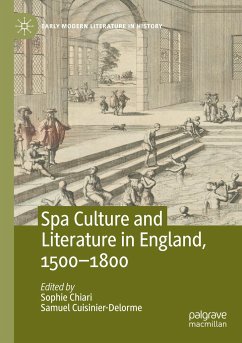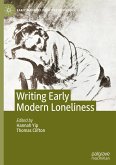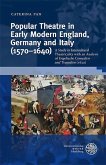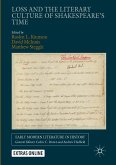Spa Culture and Literature in England, 1500-1800
Herausgegeben:Chiari, Sophie; Cuisinier-Delorme, Samuel
Spa Culture and Literature in England, 1500-1800
Herausgegeben:Chiari, Sophie; Cuisinier-Delorme, Samuel
- Broschiertes Buch
- Merkliste
- Auf die Merkliste
- Bewerten Bewerten
- Teilen
- Produkt teilen
- Produkterinnerung
- Produkterinnerung
This edited collection aims at highlighting the various uses of water in sixteenth, seventeenth, and eighteenth-century England, while exploring the tensions between those who praised the curative virtues of waters and those who rejected them for their supposedly harmful effects. Divided into three balanced sections, the collection includes contributions from renowned specialists of early modern culture and literature as well as rising young scholars as it seeks to establish a dialogue between different methodologies, and explain why the spa-related issues examined still resonate in today's society. …mehr
Andere Kunden interessierten sich auch für
![Spa Culture and Literature in England, 1500-1800 Spa Culture and Literature in England, 1500-1800]() Spa Culture and Literature in England, 1500-1800127,99 €
Spa Culture and Literature in England, 1500-1800127,99 €![Writing Early Modern Loneliness Writing Early Modern Loneliness]() Writing Early Modern Loneliness119,99 €
Writing Early Modern Loneliness119,99 €![English National Identity and the Image of the Dutch English National Identity and the Image of the Dutch]() Andrew FleckEnglish National Identity and the Image of the Dutch90,99 €
Andrew FleckEnglish National Identity and the Image of the Dutch90,99 €![English National Identity and the Image of the Dutch English National Identity and the Image of the Dutch]() Andrew FleckEnglish National Identity and the Image of the Dutch90,99 €
Andrew FleckEnglish National Identity and the Image of the Dutch90,99 €![Historicizing the Embodied Imagination in Early Modern English Literature Historicizing the Embodied Imagination in Early Modern English Literature]() Historicizing the Embodied Imagination in Early Modern English Literature119,99 €
Historicizing the Embodied Imagination in Early Modern English Literature119,99 €![Popular Theatre in Early Modern England, Germany and Italy (1570-1640) Popular Theatre in Early Modern England, Germany and Italy (1570-1640)]() Caterina PanPopular Theatre in Early Modern England, Germany and Italy (1570-1640)45,00 €
Caterina PanPopular Theatre in Early Modern England, Germany and Italy (1570-1640)45,00 €![Loss and the Literary Culture of Shakespeare's Time Loss and the Literary Culture of Shakespeare's Time]() Loss and the Literary Culture of Shakespeare's Time82,99 €
Loss and the Literary Culture of Shakespeare's Time82,99 €-
-
-
This edited collection aims at highlighting the various uses of water in sixteenth, seventeenth, and eighteenth-century England, while exploring the tensions between those who praised the curative virtues of waters and those who rejected them for their supposedly harmful effects. Divided into three balanced sections, the collection includes contributions from renowned specialists of early modern culture and literature as well as rising young scholars as it seeks to establish a dialogue between different methodologies, and explain why the spa-related issues examined still resonate in today's society.
Produktdetails
- Produktdetails
- Early Modern Literature in History
- Verlag: Palgrave Macmillan / Springer International Publishing / Springer, Berlin
- Artikelnr. des Verlages: 978-3-030-66570-8
- 1st edition 2021
- Seitenzahl: 324
- Erscheinungstermin: 2. Juni 2022
- Englisch
- Abmessung: 210mm x 148mm x 18mm
- Gewicht: 421g
- ISBN-13: 9783030665708
- ISBN-10: 3030665704
- Artikelnr.: 63971051
- Herstellerkennzeichnung Die Herstellerinformationen sind derzeit nicht verfügbar.
- Early Modern Literature in History
- Verlag: Palgrave Macmillan / Springer International Publishing / Springer, Berlin
- Artikelnr. des Verlages: 978-3-030-66570-8
- 1st edition 2021
- Seitenzahl: 324
- Erscheinungstermin: 2. Juni 2022
- Englisch
- Abmessung: 210mm x 148mm x 18mm
- Gewicht: 421g
- ISBN-13: 9783030665708
- ISBN-10: 3030665704
- Artikelnr.: 63971051
- Herstellerkennzeichnung Die Herstellerinformationen sind derzeit nicht verfügbar.
Sophie Chiari is Professor of English Literature at the Université Clermont Auvergne, France, specializing in ecocritical studies. Previous publications include Shakespeare's Representation of Weather, Climate and Environment (2019). She is currently working on Shakespeare's Environment: A Dictionary (2021). Samuel Cuisinier-Delorme is a lecturer at the Université Clermont Auvergne where his research focuses on English Literature from the 16th _18th centuries. Samuel lives and works in Vichy, where he is developing research projects on waters and balneology. He is currently planning a seminar on spa literature and is also working on a forthcoming book in French on the same topic, Regards sur le thermalisme européen du Moyen Âge au XIXe siècle (2021).
PART I: Generic Explorations: Baths and Waters in Poetry, Drama and Prose.- Chapter 1: "Bathing [...] in origane and thyme": Baths in Spenser's The Faerie Queene.- Chapter 2: Fountain, Waters and Spas in John Webster's The Duchess of Malfi: From Blood Baths to 'Turkish delights'.- Chapter 3: Taking the Cure: Mineral Waters and Love's Folly in Lady Mary Wroth's The Countess of Montgomery's Urania.- Chapter 4: Bristol and Bath in Frances Burney's Evelina.- Chapter 5: "Oh! Who can ever be tired of Bath?": The sense of place in Jane Austen's Northanger Abbey and Persuasion.- PART II: Taking the Waters: Myth, Recreation and Satire.- Chapter 6: Bath and Bladud: The Progress of a Wayward Myth.- Chapter 7: Creatures of the Bath: Transformations at the Early Modern British Spa.- Chapter 8: Bathing in Verse: Christopher Anstey's The New Bath Guide and Georgian Resort Satire.- Chapter9: "For Music is wholesome the Doctors all think": The Curative and Restorative Function of Music in Eighteenth-Century English Spas.-PART III: Emerging Science: The Therapeutic Uses of Waters.- Chapter 10: "Water of Paradise": The Role and Function of Balneology in Bacon's New Atlantis, De vijs mortis and Historia vitae et mortis.- Chapter 11: "Minerals in Winter": Robert Wittie's Cold Treatment.- Chapter 12: Mineral Waters as a Treatment for Barrenness in Eighteenth-Century Britain.- Chapter 13: Drowning in Health: Murky Perceptions of Mineral Water and Alcohol in Eighteenth-Century Medical Literature and Social Mores.- Coda: New ecocritical perspectives.- Chapter 14: All is Deep: All is Shallow.
PART I: Generic Explorations: Baths and Waters in Poetry, Drama and Prose.- Chapter 1: "Bathing [...] in origane and thyme": Baths in Spenser's The Faerie Queene.- Chapter 2: Fountain, Waters and Spas in John Webster's The Duchess of Malfi: From Blood Baths to 'Turkish delights'.- Chapter 3: Taking the Cure: Mineral Waters and Love's Folly in Lady Mary Wroth's The Countess of Montgomery's Urania.- Chapter 4: Bristol and Bath in Frances Burney's Evelina.- Chapter 5: "Oh! Who can ever be tired of Bath?": The sense of place in Jane Austen's Northanger Abbey and Persuasion.- PART II: Taking the Waters: Myth, Recreation and Satire.- Chapter 6: Bath and Bladud: The Progress of a Wayward Myth.- Chapter 7: Creatures of the Bath: Transformations at the Early Modern British Spa.- Chapter 8: Bathing in Verse: Christopher Anstey's The New Bath Guide and Georgian Resort Satire.- Chapter9: "For Music is wholesome the Doctors all think": The Curative and Restorative Function of Music in Eighteenth-Century English Spas.-PART III: Emerging Science: The Therapeutic Uses of Waters.- Chapter 10: "Water of Paradise": The Role and Function of Balneology in Bacon's New Atlantis, De vijs mortis and Historia vitae et mortis.- Chapter 11: "Minerals in Winter": Robert Wittie's Cold Treatment.- Chapter 12: Mineral Waters as a Treatment for Barrenness in Eighteenth-Century Britain.- Chapter 13: Drowning in Health: Murky Perceptions of Mineral Water and Alcohol in Eighteenth-Century Medical Literature and Social Mores.- Coda: New ecocritical perspectives.- Chapter 14: All is Deep: All is Shallow.








